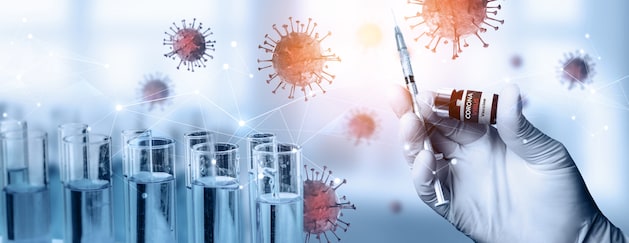Even long after the large-scale vaccinations against Covid-19, scary reports about possible consequences are circulating through social networks. Upon closer inspection, there is often little left of it.
As in Germany, more than three quarters of the population in Japan have received at least one vaccination against the coronavirus. Opponents of vaccination have been running against it for years with all sorts of, often refuted, arguments. Social network users have recently been spreading the word that a Japanese study has shown that the number of cancer cases has increased explosively due to the corona vaccination with the mRNA vaccine. Japan therefore declared a state of emergency. Is that correct?
No. Japan has not declared a state of emergency, nor does the research mentioned provide evidence of an increase in cancer cases due to mRNA vaccines.
Various German-language posts refer to a blog entry, which in turn is based on an article by The People’s Voice. That should make you suspicious: The People’s Voice regularly spreads disinformation.
In fact, there is little to no truth to the claim that Japan has declared a “national emergency” due to a rise in “aggressive forms of turbo cancer” due to mRNA vaccines.
First: The government in Tokyo has not declared a national emergency. There is no such declaration, there is no announcement on government websites, and there is no coverage of the claimed emergency in Japanese media. The alleged “emergency” is simply made up.
However, due to the Covid-19 pandemic, the Japanese government declared a state of emergency for Tokyo and a number of other prefectures (regions) four years ago – on April 7, 2020. It later applied to the entire country and was lifted for all of Japan at the end of September 2021, also due to the success of the vaccination campaign.
Second: The author of the study cited has already severely limited the significance of her own study: “This study was carried out using descriptive statistics from public sources and has not been clinically validated. Further analytical statistical studies based on vaccination status are required,” writes study leader and pediatrician Miki Gibo from the Japanese town of Yusuhara.
The blog entry links to this very paper entitled “Increased Age-Adjusted Cancer Mortality After the Third mRNA-Lipid Nanoparticle Vaccine Dose during the COVID-19 Pandemic in Japan.” During the Covid-19 Pandemic in Japan), which was published on April 8, 2024. It was published in the medical journal Cureus, part of the scientific publisher Springer Nature Group.
According to the study, there was no significant excess mortality in Japan in the first year of the pandemic (2020). However, in 2021, “some increased cancer mortality rates” were recorded after vaccinations with the first and second doses of the vaccine. In 2022, “after mass vaccination with the third dose,” significantly increased mortality rates were observed, particularly for ovarian cancer, leukemia, prostate cancer, lip, oral, pharyngeal and pancreatic cancer, and breast cancer.
It is further speculated that the high increases “could be due to various mechanisms of mRNA-LNP vaccination and not to the Covid-19 infection itself or to reduced cancer treatment due to the lockdown”. This possibility “requires further studies,” the authors write, but then qualify.
Third: With the publicly available data, “no correlation, let alone causality, can be proven,” emphasizes the operator of the science blog TechARP, Adrian Wong. The paper does not even contain the vaccination status of the people included in the study. And only around two thirds of the population received three doses of the vaccine – so it is not known how often the cancer patients who died actually received it.
In addition, Japan also used vaccines that were not based on mRNA technology: Therefore, excess mortality from mRNA vaccinations can hardly be counted with the data used. In addition, there is no control group. “For all we know, the excess deaths could be due to unvaccinated cancer patients dying from Covid-19. “After all, cancer patients are more likely to die from Covid-19 than healthy people,” explains Adrian Wong.
Other scientists also criticize the study’s approach. In the reactions on the Cureus website, a Japanese doctor accuses the author of “speculation”. Another doctor points to the decline in age-adjusted cancer death rates in Japan from 2021 to 2022 and says: “This study adds nothing useful to the medical literature.”
Even the website trialsitenews.com – which describes itself as an “independent, censorship-free medium for health and biomedical research” – wrote that while the study raises troubling questions, “these study results do not amount to confirmatory evidence that between Covid-19 vaccines and cancer are causally related.”
Fourth, scientists deny that “turbo cancer” even exists. The neologism “turbo cancer” is a layman’s term, not a well-known medical term. There are no entries with this search term on the website of the German Society for Hematology and Medical Oncology (DGHO). The DGHO is not aware of an alleged increase in tumor findings as a result of the vaccination.
“If this were a real problem, we would have noticed it,” Jena professor Marie von Lilienfeld-Toal, board member of the Working Group on Infections in the DGHO, told the dpa in January 2022. “We are not finding an increased rate of relapses.” The scientific association recommends vaccination for cancer patients because they are at particularly high risk of a severe course of Covid-19.
